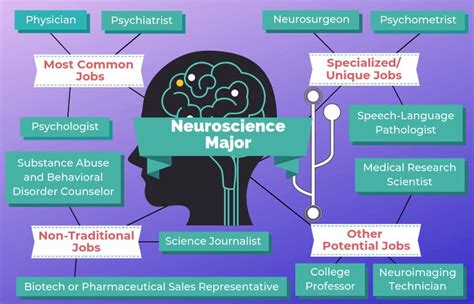Introduction

The field of neuroscience psychology has made significant strides in understanding the human brain and its functions. As a result, this field offers numerous job opportunities for professionals interested in studying the brain and its impact on behavior and cognition.
Types of Neuroscience Psychology Jobs
Here are some of the most common types of neuroscience psychology jobs:
-
Neuropsychologist: Neuropsychologists assess and treat individuals with brain injuries or neurological disorders. They use various techniques to evaluate cognitive skills, behavior, and social functioning.
-
Cognitive Neuroscientist: Cognitive neuroscientists study how the brain processes information, learns, and remembers. They use techniques such as fMRI and EEG to understand the neural mechanisms involved in cognitive functions.
-
Behavioral Neuroscientist: Behavioral neuroscientists investigate how brain activity influences behavior. They study the neurobiological basis of behaviors such as aggression, anxiety, and reward.
-
Neuropharmacologist: Neuropharmacologists study the effects of drugs and other substances on the brain and nervous system. They develop and test new drugs for treating neurological disorders.
-
Neurologist: Neurologists diagnose and treat disorders of the nervous system, including the brain, spinal cord, and peripheral nerves. They use a variety of diagnostic and treatment techniques.
Education and Training
Most neuroscience psychology jobs require a PhD in neuroscience, psychology, or a related field. Some positions may require additional training, such as postdoctoral fellowships or specialized certifications.
Salary and Job Outlook
The median annual wage for psychologists in the United States is $82,180, with the top 10% earning more than $135,550. The job outlook for psychologists is expected to be positive, with a projected 3% growth in employment over the next decade.
Why Neuroscience Psychology Matters
Neuroscience psychology helps us understand the complex workings of the human brain. This knowledge provides valuable insights into a wide range of mental and behavioral conditions, helping us develop more effective treatments and interventions.
Benefits of a Neuroscience Psychology Career
- High earning potential
- Challenging and rewarding work
- Opportunities to make a meaningful impact on people’s lives
- Access to cutting-edge technology and research
Tips and Tricks for Success
- Pursue a strong education: Get a solid foundation in neuroscience, psychology, and research methods.
- Gain practical experience: Participate in internships, research projects, and clinical rotations.
- Network with professionals: Attend conferences, join professional organizations, and connect with experts in the field.
- Stay up-to-date with research: Read scientific journals, attend workshops, and keep abreast of the latest advancements.
- Be passionate about your work: Choose a career path that aligns with your interests and values.
Comparison of Pros and Cons
Pros
- High salary potential
- Rewarding and impactful work
- Opportunities for professional growth
- Cutting-edge technology and research
Cons
- Rigorous education and training
- Competition for jobs
- Potential for long work hours
- Emotional challenges of working with patients
Creative Applications of Neuroscience Psychology
The field of neuroscience psychology has the potential to be applied to a wide range of fields, including:
- Healthcare: Improving diagnosis and treatment of neurological disorders
- Education: Enhancing learning and memory
- Business: Understanding consumer behavior and marketing strategies
- Law Enforcement: Identifying and apprehending criminals
Useful Tables
Table 1: Salary and Job Outlook for Psychologists
| Degree | Median Annual Wage (2021) | Projected Job Growth (2021-2031) |
|---|---|---|
| PhD | $82,180 | 3% |
| Master’s | $65,720 | 2% |
| Bachelor’s | $51,640 | 0% |
Table 2: Types of Neuroscience Psychology Jobs
| Job Title | Description |
|---|---|
| Neuropsychologist | Assesses and treats individuals with brain injuries or neurological disorders. |
| Cognitive Neuroscientist | Studies how the brain processes information, learns, and remembers. |
| Behavioral Neuroscientist | Investigates how brain activity influences behavior. |
| Neuropharmacologist | Studies the effects of drugs and other substances on the brain and nervous system. |
| Neurologist | Diagnoses and treats disorders of the nervous system. |
Table 3: Education and Training for Neuroscience Psychology Jobs
| Degree | Typical Duration |
|---|---|
| PhD | 5-7 years |
| Master’s | 2-3 years |
| Bachelor’s | 4 years |
Table 4: Tips for a Successful Neuroscience Psychology Career
| Tip | Description |
|---|---|
| Pursue a strong education | Get a solid foundation in neuroscience, psychology, and research methods. |
| Gain practical experience | Participate in internships, research projects, and clinical rotations. |
| Network with professionals | Attend conferences, join professional organizations, and connect with experts in the field. |
| Stay up-to-date with research | Read scientific journals, attend workshops, and keep abreast of the latest advancements. |
| Be passionate about your work | Choose a career path that aligns with your interests and values. |
